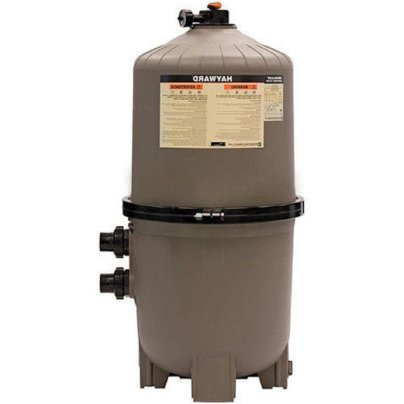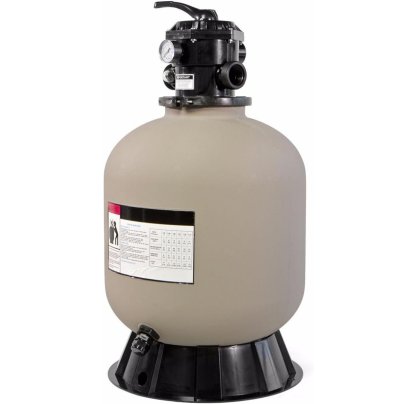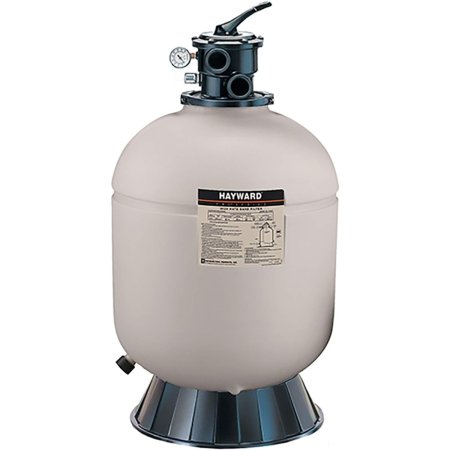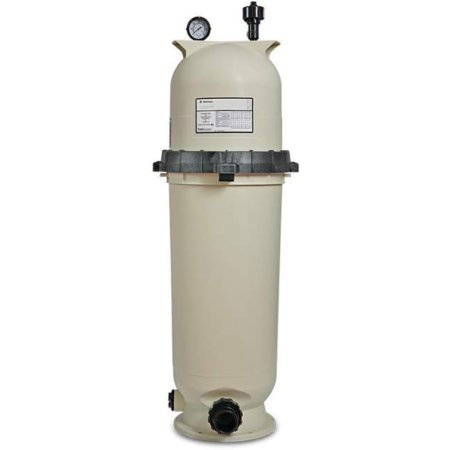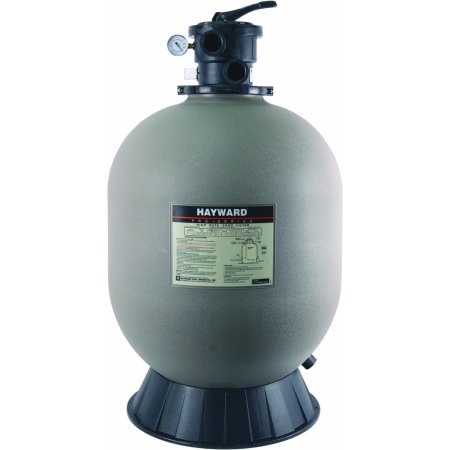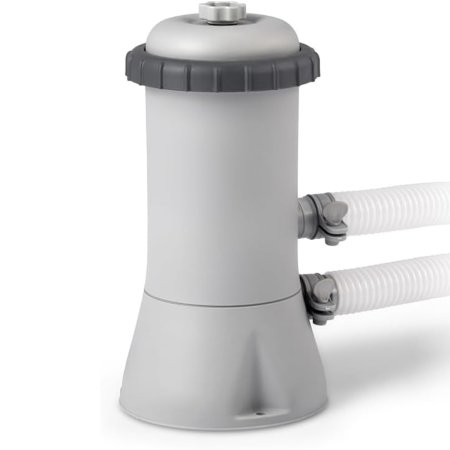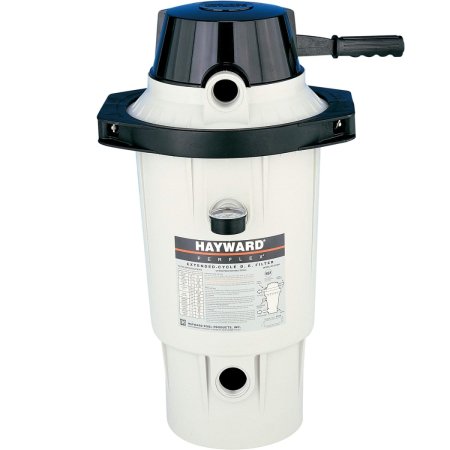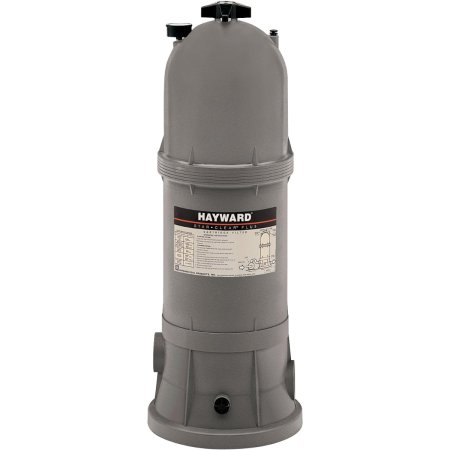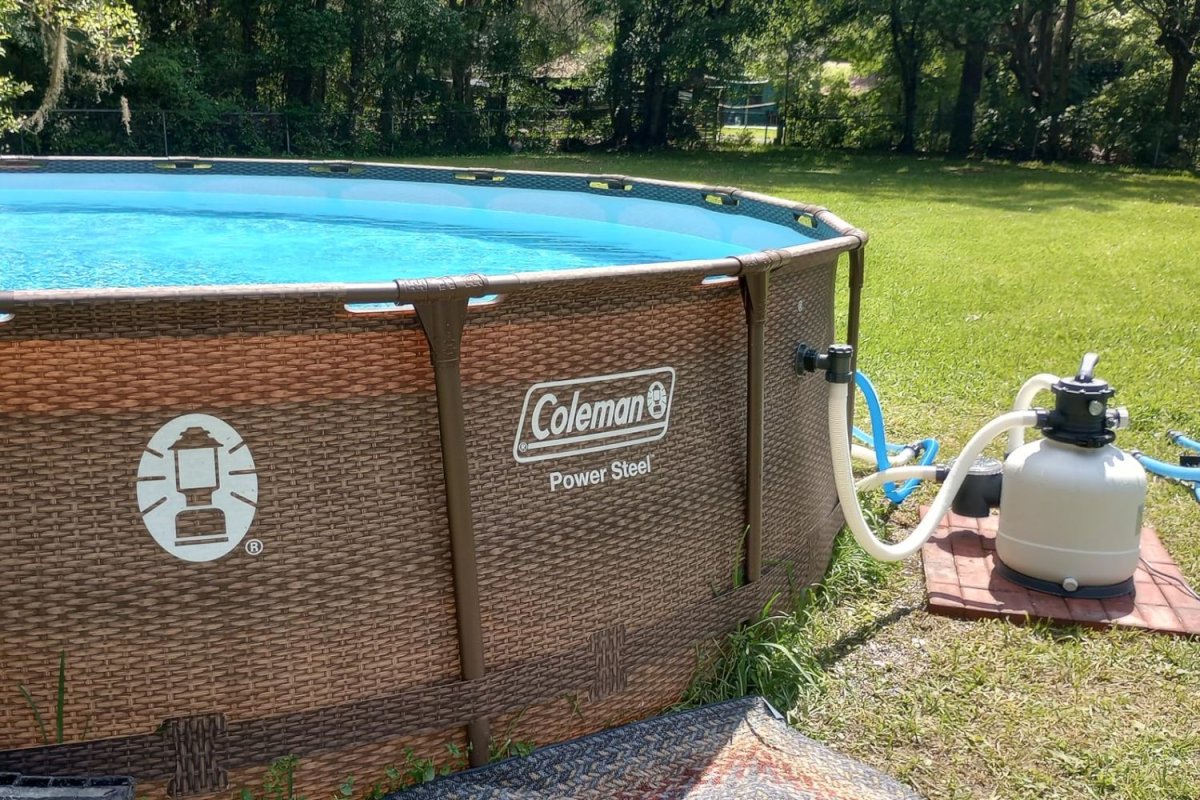
We may earn revenue from the products available on this page and participate in affiliate programs. Learn More ›
A pool filter is absolutely vital to the function of any swimming pool. It’s responsible for removing contaminants from the pool water, ensuring that the pool not only stays crystal clear but also free of bacteria and other contaminants that present health hazards.
Pool filters use a variety of means for filtering water, including sand, paper cartridges, and diatomaceous earth. They come in various sizes to meet the needs of above-ground and inground pools, both large and small. With so many shapes, sizes, and brands to choose from, selecting the right model for one’s pool can quickly become an overwhelming process. Our top recommendation is the ProGrid from Hayward, thanks to its durable construction and impressive flow rates for pools up to 60 square feet.
This guide dives into the world of pool filters through research and/or hands-on testing to identify what factors are crucial to consider when shopping for the best pool filter, while evaluating some of the top models on the market.
- BEST OVERALL: Hayward DE6020 ProGrid D.E. Pool Filter
- RUNNER-UP: Hayward W3S180T ProSeries Sand Filter
- BEST BANG FOR THE BUCK: XtremePowerUS 19″ Swimming Pool Sand Filter
- BEST CARTRIDGE: Pentair 160332 Clean and Clear Cartridge Pool Filter
- BEST SAND: Hayward W3S244T ProSeries Pool Sand Filter
- BEST ABOVE-GROUND: Carvin Laser 22.5″ Above-Ground Pool Sand Filter
- BEST WITH PUMP: Hayward W3CC15093S XStream Above-Ground Filter Pump
- BEST FOR SMALL POOLS: Intex Krystal Clear Cartridge Filter Pump
- BEST FOR LARGE POOLS: Hayward W3EC50AC Perflex DE Pool Filter
- BEST DESIGN: Hayward W3C12002 StarClear Plus Cartridge Pool Filter
- ALSO CONSIDER: Intex Krystal Clear Sand Filter Pump

How We Chose the Best Pool Filters
In evaluating dozens of pool filters for this guide, we researched and/or hands-on tested an extensive list of products based on important shopping considerations listed below. In our research, we concluded that a pool filter should be both easy to maintain and durable. As such, we chose models with tough, molded plastic construction that could resist harmful ultraviolet (UV) rays as well as extreme cold.
For ease of maintenance, we chose models with designs that allow the user to conduct minimal maintenance quickly. For cartridge filters, we chose models with quick-release fittings that allow the user to access the cartridge without having to remove a lot of hardware first. For sand and D.E. filters, we selected models with multiport valves that allow the user to easily change the filter to different operating modes for back-flowing and winterizing.
Our Top Picks
The list below narrows the field to some of the top pool filters on the market through rigorous hands-on testing and/or thorough research. It includes both above-ground and inground pool filters with flow rates for pools both large and small.
Best Overall
Hayward DE6020 ProGrid D.E. Pool Filter
Pros
- High flow rate and capacity; can accommodate pools of up to 60 square feet
- Quick-release flange clamp for easy maintenance; fastens the tank top and bottom
- High-impact grid elements aid upflow filtration and top-down backwashing
- Durable copolymer construction is built to withstand the elements for long-term use
Cons
- Expensive compared to other pool filter options on the market
- Multiport valve is not included with purchase
Product Specs
- Type: D.E.
- Flow rate: 120 gallons per minute (GPM)
- Size: 24 inches wide by 46.5 inches tall
Though more expensive and requiring more maintenance than other types of filters, D.E. pool filters do the best job when it comes to cleaning contaminants out of a pool. Of all the D.E. filters out there, this model from Hayward is one of the best. The DE6020 has an ample flow rate of 120 GPM and is constructed out of durable glass-reinforced copolymer, ensuring it will endure the elements. High-impact grid elements also aid upflow filtration and top-down backwashing.
D.E. filters have high maintenance requirements but Hayward makes them easier to perform with a few useful design features, including a one-piece flange clamp that makes it easy to open the filter to access its interior and a quick-release valve for bleeding air out of the pool filter pump to improve flow.
Get the Hayward ProGrid pool filter at Amazon.
Runner-up
Hayward W3S180T ProSeries Sand Filter
Pros
- Made with an umbrella-fold self-cleaning lateral system and a top diffuser for even distribution
- Large drain and pump-to-filter union connection allows for quick checks and winterizing
- 7-position VariFlo valve allows for complete control over the system
Cons
- Only suitable for use with above-ground pool varieties
Product Specs
- Type: Sand
- Flow rate: 35 GPM
- Size: 18.5 inches wide by 35 inches high
Hayward is a renowned name when it comes to pool filters, and this model is no exception. This ProSeries sand filter is made for above-ground pools and comes with an umbrella-fold self-cleaning lateral system and top diffuser for even distribution, long lifespan, and an efficient flow rate of 36 GPM.
This model also comes in multiple sizes to accommodate varying pool volumes, and the seven-position VariFlo valve allows for maximum control over the system’s operation. Need more? This model also has a large drain and pump-to-filter union connection that allows for rapid winterizing or quick adjustments as well as a pressure gauge.
What our tester says: Stephanie Cronk, executive editor of commerce at Bob Vila, notes that “we have used this sand filter for 8 years with no issues beyond typical maintenance of replacing the sand every 3 to 5 years. The filter has an easy-to-use valve allowing for easy backwashing with the twist of a handle. We leave our filter out in all elements, including Northeast snow and ice, and we’ve never had a problem with rusting or deterioration.”
Get the Hayward W3S180T pool filter at Amazon, Lowe’s, or The Home Depot.
Best Bang For The Buck
XtremePowerUS 19" Swimming Pool Sand Filter
Pros
- Works with above-ground or inground pools for peak versatility
- 7-way multiport controls make maintenance tasks easier and adjust the system settings
- 360-degree valve rotation prevents clogs and keeps all plumbing in order
- Affordably priced compared to other options currently on the market
Cons
- Smaller capacity than some pool filters; may be ideal for smaller pool varieties
Product Specs
- Type: Sand
- Flow rate: 20 to 160 GPM
- Size: 19 inches wide by 45 inches tall
With price tags that go into the thousands of dollars, a swimming pool filter replacement can quickly become a major investment. That’s why this sand filter from Xtremepower is such a nice option. It boasts a flow rate of 20 to 160 GPM, which is enough to service a 24,000-gallon pool.
Seven-way multiport controls located on the filter’s lid allow the user to change the filter’s flow to handle rinsing, filtration, backwashing, and even winterizing with just the turn of a lever. A large pressure gauge makes it easy to see when it’s time to backwash the filter. This option also comes with 360-degree valve rotation for smooth plumbing. In addition to being affordable, this filter is also versatile, since it will work with both inground and above-ground pools.
Get the XtremePowerUS pool filter at Amazon.
Best Cartridge
Pentair 160332 Clean and Clear Cartridge Pool Filter
Pros
- High flow rate can handle larger pools of 30,000 gallons or more
- Easy-to-maintain cartridge filters; simply rinse with a garden hose and return to the pool
- Continuous High Flow Internal Air Relief automatically releases pressure
- National Sanitation Foundation (NSF)-listed product for effectiveness and reliability
Cons
- Expensive option compared to some other filtration systems on the market
Product Specs
- Type: Cartridge
- Flow rate: 150 GPM
- Size: 55 inches tall by 21.5 inches in diameter
With a broad filtration surface area and high flow rate, this cartridge filter from Pentair is a great option for larger pools. The filter boasts a flow rate of 150 gallons per minute, making it a worthy choice for larger inground pools of 30,000 gallons or more. Unlike sand and D.E. filters that require periodic backwashing, Pentair’s cartridge filter is easy to maintain. Simply remove the filter, rinse it with a garden hose, and replace it.
The NSF-listed Pentair filter also self-regulates its internal pressure, thanks to its Integrated Continuous High Flow Internal Air Relief, which automatically releases pressure that can inhibit the flow of water through the filter.
Get the Pentair pool filter at Amazon.
Best Sand
Hayward W3S244T ProSeries Pool Sand Filter
Pros
- Comes with a 6-position VariFlo control valve for controlling the filtration system
- Top-mounted handle eases performance of maintenance tasks
- Tough polymer construction will not corrode or wear with time
- Self-cleaning drain makes winterizing and maintenance tasks easier
Cons
- Smaller capacity than other sand filters on the market
- Only suitable for use with inground pool sand filters
Product Specs
- Type: Sand
- Flow rate: 62 GPM
- Size: 42 inches high by 24.5 inches wide
With its tough polymer construction, this Hayward sand filter’s tank is built like a tank and is one of the most well-built sand filters on the market. In addition to being durable, this model makes it easy to conduct regular maintenance, thanks to a six-position VariFlo valve on the top of the filter. With the valve, a pool owner can easily set this small pool filter for backwashing, rinsing, winterizing, and other functions.
The ProSeries Pool Sand Filter comes with some useful additional features, including a top diffuser that ensures even distribution of water through the sand, a self-cleaning drain that makes it easy to empty the filter come wintertime, and a gauge for monitoring pressure.
Get the Hayward W3S244T pool filter at Amazon.
Best Above-ground
Carvin Laser 22.5" Above-Ground Pool Sand Filter
Pros
- 6-position valve makes maintenance and adjustments to the system easily
- Evenly distributes water for efficient operation; filters over 66 GPM
- Good capacity for above-ground pools; provides a 20 to 25 GPM flow rate
- 2 hose adapters included for added ease of use and installation
Cons
- Bulkier than other above-ground swimming pool filters on the market
- Cannot be used in any inground pool sand filter varieties
Product Specs
- Type: Sand
- Flow rate: 20 to 25 GPM
- Size: 24 inches wide by 41 inches tall
This sand filter’s flow rate of 20 GPM can keep the water in a 31,000-plus gallon pool clean. Couple that with a six-position valve that makes it easy to backwash, rinse, drain, winterize, or test the filter, and the Carvin Laser is one of the best above-ground pool filter options on the market.
The filter efficiently filters water by using a side-slotted lateral design and an underdrain to distribute water evenly across the surface of 250 pounds of sand. It is durably built with a molded plastic UV- and corrosion-resistant tank and two hose adapters. A drain located at the bottom of the tank makes it easy to empty the filter for winterizing or sand changes.
Get the Carvin pool filter at Amazon.
Best With Pump
Hayward W3CC15093S XStream Above-Ground Filter Pump
Pros
- High flow rate of 100 GPM is ideal for pools of up to 150 square feet
- Large size is capable of distributing dirt and debris evenly through the filter
- Works with rigid or flexible plumbing varieties currently included in some pools
- More affordable than buying units separately
Cons
- Not as powerful as some other filters included on this list
Product Specs
- Type: Cartridge
- Flow rate: 100 GPM
- Size: 23 inches wide by 37.25 inches tall
Stop worrying about pump and filter compatibility with this pool pump and filter combo from Hayward, which includes both. It comes with a Hayward XStream cartridge filter and a 1.5-horsepower Hayward PowerFlo Matrix pump. This powerful combo can move up to 100 GPM, making it ideal for a large above-ground pool.
It’s also easy to maintain, thanks to an Easy-Lok ring design that allows access to the filter’s internal parts in a single turn. This versatile pool pump and filter combo will work with flexible or rigid plumbing. Both units sit on a rigid base, making it easy to mount on the ground next to the pool.
Get the Hayward W3CC15093S pool filter at Amazon or The Home Depot.
Best For Small Pools
Intex Krystal Clear Cartridge Filter Pump
Pros
- Uses a convenient filter housing and disposable filter for easy maintenance
- Compact size with combined pump and filter for space-saving capability
- Easy to install; just hook up the unit to hoses and plug it in
Cons
- Filters only last 2 weeks; not as user-friendly as some other automated filters
- Limited versatility; only works with Intex pool varieties
Product Specs
- Type: Cartridge
- Flow rate: 16.67 GPM
- Size: 10.6 inches wide by 15 inches tall
The Krystal clear cartridge filter pump is ideal for smaller, temporary above-ground pools. Its 16.67 GPM filter and the pump are suitable for pools with up to 6,000 gallons of water, which includes 10-foot to 18-foot round Intex Easy Set and metal frame pools.
The Krystal clear cartridge filter pump housing opens to hold a disposable cartridge, which lasts about 2 weeks. An air release valve prevents too much pressure from building up inside the pump and filter, slowing water flow. Setting up the pump/filter is easy. Simply attach 1.25-inch hoses to the fittings and to the intake and outtake holes in the pool.
Get the Intex cartridge pool filter at Amazon.
Best For Large Pools
Hayward W3EC50AC Perflex DE Pool Filter
Pros
- Suitable for above-ground pool varieties of up to 25,000 gallons
- Holds up to 5 pounds of diatomaceous earth (D.E.); filters particles as small as 2 microns
- “Flex-tube” technology recirculates the filtration media to refresh and clean water repeatedly
Cons
- Only suitable for use as an above-ground pool filter
- Comes with a higher price tag than other options currently available
Product Specs
- Type: Cartridge
- Flow rate: 50 GPM
- Size: 31.375 inches tall by 16 inches wide
Large pool varieties need a heavy-duty filter like this Hayward model, capable of providing reliable and effective filtration in above-ground pools of over 25,000 gallons. Built with a 1-horsepower pump, this model has a large tank that holds 5 pounds of D.E. to filter out small unwanted particles as tiny as 2 microns in size. This Hayward filter also comes with “flex-tube” technology that enables the D.E. to recycle repeatedly for added filtration.
Get the Hayward W3EC50AC pool filter at Amazon.
Best Design
Hayward W3C12002 StarClear Plus Cartridge Pool Filter
Pros
- Durable single-piece injection molding provides durability and corrosion resistance
- Single knob-release grants easy access for maintenance to the filter and filter tank
- High flow rate of over 120 GPM; suitable for medium to large pool sizes
- Compact size for the amount of filtration efficiency this unit provides
Cons
- Doesn’t clean as well as some of the D.E. filters on this list
Product Specs
- Type: Cartridge
- Flow rate: 120 GPM
- Size: 13.375 inches wide by 36 inches tall
This Hayward filter might look a little more like a fire hydrant than a pool filter, but that’s because it’s built to be tough. Its single-piece injection molding construction is well suited for enduring the elements. In addition to its durable construction, it’s also easy to maintain. A single knob release that securely fastens the filter head to the tank makes it easy to access the filter cartridge.
With its flow rate of 120 GPM, this filter can service large inground pools with up to 60,000 gallons of water. Despite its high capacity, the filter is fairly compact at just 13.375 inches in diameter and 36 inches tall.
Get the Hayward StarClear pool filter at Amazon.
Also Consider
Intex Krystal Clear Sand Filter Pump
Pros
- Comes with a 6-function control valve to quickly adjust the pool filter system
- 24-hour timer allows for automated use; can be set between 2- and 12-hour increments
- Comes with a built-in ground-fault circuit interpreter (GFCI), two 1.5-inch connector hoses, and a strainer basket
- Adds ions to the water surface to reduce algae and microorganism growth
Cons
- Only suitable for use in above-ground pool varieties
- Plunger valves and outlet fittings are not included with the purchase
Product Specs
- Type: Sand
- Flow rate: 35 GPM
- Size: 22.9 inches high by 23.5 inches wide
The Intex Krystal Clear sand filter pump is a reliable option for those who prefer sand filters for pools. Made with a six-function control valve, users can quickly switch between backwashing, filtering, rinsing, recirculating, draining, and closing down the filter easily. It can hold over 50 pounds of pool filter sand or 35 pounds of glass media.
The filter also comes with an adjustable 24-hour timer that can be set between 2- and 12-hour increments for automated use. Plus, it comes with a strainer basket, two 1.5-inch connector hoses, a built-in GFCI, a pump flow rate of 35 GPH, and a system flow rate of 26.7 GPM. Overall, the system improves water clarity, circulation, and filtration by adding ions to the water surface which neutralizes algae and microorganism growth.
Get the Intex sand pool filter at Amazon, The Home Depot, or Target.
Jump to Our Top Picks
What to Consider When Choosing a Pool Filter
There are a variety of factors one needs to consider when shopping for the right pool filter including type, flow rate, and compatibility. Read on to learn more about these and other attributes of pool filters.
Types of Pool Filters
Buyers must consider three types of pool filters, each of which has its pros and cons. The most popular types of pool filters on the market are sand, cartridge, and D.E. filters.
Sand
A sand pool filter works by sucking water through a filtration tank filled with sand. As the water passes through, it grabs particles of dirt that measure 20 microns or larger. The best pool sand filter requires minimal maintenance and is more affordable than other filters, but doesn’t capture particles as small as other filter types can nab.
Sand filters come in two types—top-mounted and side-mounted filters. Top-mounted sand filters are less expensive and take up less space than a side-mount filter; however, the side-mount filter makes it easier to change the sand, since it doesn’t require you to disconnect pipes.
Cartridge
Pool cartridge filters use a replaceable filter that collects dirt and debris as it passes through. Cartridge filters are effective because they can trap particles as small as 10 microns. Maintaining a cartridge filter is relatively easy since it can be removed and sprayed clean with a hose.
D.E.
D.E. filters (the D.E. stands for “diatomaceous earth”), works similarly to a sand filter but rather than pump water through sand, it pumps water through D.E., which is a fine powder that can capture particles as small as 5 microns. D.E. is the most effective filter due to its ability to remove tiny particles from the pool; however, this type of filter is more expensive than cartridge or sand types and requires the most maintenance.
Flow Rate and Capacity
Filters come in different sizes to handle swimming pools of various capacities. Most filters are rated by gallons per minute. A filter must have a flow rate that at least matches the gallons per minute of the pump, or higher. The GPM of a pool filter is a great indication of how large a pool the filter can handle.
A pool filter should be able to filter the entire contents of a pool in about 8 hours. So, a pool filter with a flow rate of 50 GPM has enough filtering capacity to service pools up to 24,000 gallons (50 x 60 x 8).
Pump Compatibility
A filter won’t work without a pool pump to push water through it. When selecting a pump and filter, it’s crucial to make sure they are compatible with each other. The pump must be powerful enough to push water through the filter without being so powerful that it damages it.
When selecting a filter, choose a model with a flow rate that’s a little higher than the pump’s flow rate. Never choose a filter with a flow rate that is less than the pump’s flow rate, since this can damage the filter. Working together, the pool filter and pump should be able to clean the entire contents of the pool about every 8 hours.
Additional Features
Most pool filters have features that make them easier to use. Pressure gauges measure how well the system is drawing water from the pool. This lets the user know if the filter cartridge should be changed, in the case of a cartridge filter, or backwashed, in the case of a sand or D.E. filter.
Filters typically have features that make performing routine maintenance easier. Many use quick-release knobs that allow the user to quickly open the filter’s lid without having to remove a lot of hardware. Other models have multiport designs with switches that allow the user to winterize, rinse, and backflush the filter with the turn of a knob.
FAQs
If you’re wondering whether a cartridge of a sand filter is better or if all filters can be used or how often a cartridge filter should be replaced, then read on for answers to these and other commonly asked questions about pool filters.
In terms of their ability to filter out contaminants, cartridge filters are better. Cartridge filters have a larger filtration area, which allows them to remove smaller particles than a sand filter can. They also are easier to maintain since they require no backwashing.
Foam pool filters are more economical than paper filters. Whereas paper filters wear out and must be replaced every 1 to 2 weeks, foam filters last around 2 months. You can clean foam filters with a garden hose and put them back into service.
Pool cartridges last between 1 and 3 years, depending on how often they’re used and how often they’re cleaned. Users will always want to consult the user manual of their chosen filter to ensure they know how to clean the pool filter and are using their filtration system correctly.
D.E. filters remove the smallest particles of the three filter types with their ability to trap particles as small as 2 to 3 microns.
To change the sand in a pool filter, begin with draining the tank by opening the drain cap at the bottom of the tank. Remove the hoses connected to the filter’s multiport valve. Remove the old sand with a cup or a shop vac, making sure to first tape off the top of the pipe to prevent sand from getting inside. Carefully remove the lateral assembly and pipe, then wash out the tank with a garden hose. Replace the lateral assembly and pipe and add fresh sand.
No. You must use a filter designed for above-ground use. This is because most above-ground pool pumps are designed to move clean water to a level that’s higher than the pump while most inground pool pumps, which are situated above the water level of the pool, are not.
